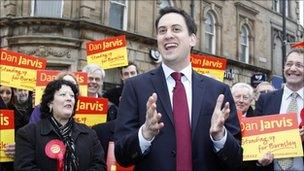Barnsley by-election: What now for Lib Dems?
- Published

Labour gained its biggest increase in vote share since 1997
Dominic Carman had a haunted look in his eyes at the prospect of finishing fourth behind UKIP or the BNP.
The Liberal Democrat candidate declined to be quoted about it on the record, when I visited Barnsley Central a week ago, but it was clear that this was his nightmare scenario.
Lord knows, then, how he must be feeling after finishing sixth, behind UKIP, the BNP and an independent candidate, and losing his deposit.
The Lib Dems are used to being the by-election kings of British politics - their campaigning machine regarded with a mixture of envy and awe by the other parties.
Party activists will look at Barnsley Central and wonder if those days are over, at least for now.
Governing parties always get a kicking in by-elections - and some will see this as another stage in the "blooding" of the Liberal Democrats, their growth into a mature party of government.
Morale
But senior figures in the party may struggle to take such a sanguine view.
They will fear it could be a foretaste of what is to come when voters go to the polls at the English local elections on 5 May and in Scottish Parliament and Welsh Assembly elections on the same day.
Voters in Barnsley told me they felt betrayed by the party - that its leaders would do and say anything to get into power.
They were particularly angry about the issue of tuition fees. One former Lib Dem voter, whose son was at university, told me he wanted to punish Nick Clegg's party for its "lies".
The party has said it is not a good idea to read too much into a by-election with such a low turnout.
And while this is true, some of the party's own past by-election triumphs, such as education minister Sarah Teather in Brent East, were achieved on a similarly low poll.
The party's share of the vote went down by 13% - its biggest drop at a by-election since 1989. Their coalition partners, the Conservatives, also had a poor night, losing half their vote, but the Lib Dems still appear to be bearing the brunt of public anger over coalition policies.
Lib Dem commentator Olly Grender, writing on the New Statesman website, external, suggests the fact that the party finished second in Barnsley Central at the general election was more to do with its standing nationally at the time, rather than any special effort by local party members.
And if Lib Dem activists nationally can keep their morale up over the coming months, and get out on to the doorstep to explain the coalition's efforts to cut the deficit and what the Lib Dems are getting out of coalition, then their vote will hold up.
Professional
After all, she argues, Labour lost deposits at by-elections in the last Parliament but still managed to bounce back.
Lib Dem deputy leader Simon Hughes said Barnsley was a "black hole" for his party, with no local councillors and few activists, a point echoed by Nick Clegg in his post mortem of the result.
Labour leader Ed Miliband will be trying not to read too much into the Barnsley by-election either, seeing it as another step along the road to, as he put it, "regaining the trust of the British people".

UKIP's Jane Collins mounted an effective campaign
Labour were always going to win this seat - but they still threw everything at the contest in an effort to put the Eric Illsley expenses saga behind them.
They were rewarded with their biggest increase in vote share - 13% - at a by-election since Tony Blair's heyday in 1997 - reason enough for their candidate Dan Jarvis, a newcomer to politics, to feel satisfied.
But where the champagne corks will really be popping is at UK Independence Party HQ, after they doubled their share of the vote and beat the Conservatives into third place - their best ever performance at a Westminster by-election.
The party benefited from what appeared to be a better-funded and more professional campaign than at previous by-elections - and a local candidate who seemed to connect well with voters on the doorstep.
But the result, coupled with the party's relatively strong showing in the Oldham East and Saddleworth by-election, suggest they could be becoming a repository for the sort of protest votes that used to go to the Lib Dems.
UKIP's long-term aim - apart from securing a referendum on Britain's membership of the European Union - is to win the next European elections, after coming second to the Conservatives in 2009.
But on this showing, they will be hoping to snatch a seat at Westminster in a by-election before the next general election into the bargain.
Their leader, Nigel Farage, has even spoken about overtaking the Lib Dems in the national opinion polls.
And that really would be a nightmare scenario for Nick Clegg's party.
- Published4 March 2011
- Published4 March 2011